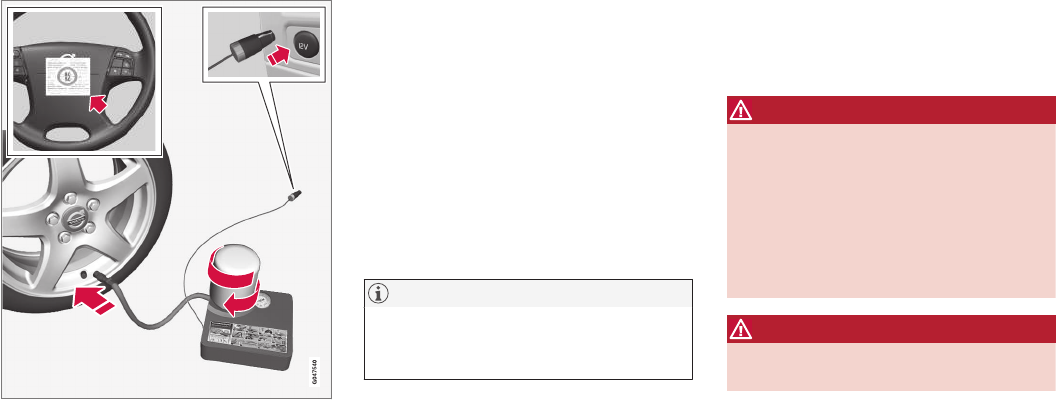WHEELS AND TYRES
352
Emergency puncture repair -
operation
Sealing a puncture with the emergency puncture
repair kit, Temporary Mobility Kit (TMK).
Emergency puncture repair
For information on the function of the parts, see Emer-
gency puncture repair kit - overview (p. 351).
1. Set up the warning triangle and activate the
hazard warning lights if a tyre is being sealed
in a trafficked location.
If the puncture was caused by a nail or simi-
lar, allow this to remain in the tyre. It helps to
seal the hole.
2. Detach the label for maximum permitted
speed (which is fitted on one side of the
compressor) and affix it to the steering
wheel. You should not drive faster than
80 km/h (50 mph) after the emergency tyre
repair kit has been used.
3.
Check that the switch is in position 0 (Off),
and locate the electrical cable and the air
hose.
4. Unscrew the orange-coloured cap from the
compressor, and unscrew the cork from the
sealing fluid bottle.
NOTE
Do not break the bottle's seal before use. The
seal is broken automatically when the bottle is
screwed in.
5. Screw in the bottle to the bottom of the bot-
tle holder.
> The bottle and the bottle holder are
equipped with a reverse catch to prevent
sealant leakage. When the bottle is
screwed in it cannot be unscrewed from
the bottle holder again. Bottle removal
must be performed at a workshop, Volvo
recommends an authorised Volvo work-
shop.
WARNING
•
In the event of skin contact with the seal-
ing fluid, it must be washed off immediately
with soap and plenty of water.
•
Sealing fluid that makes contact with an
eye must be rinsed away immediately with
eye wash fluid or with plenty of water. If the
discomfort persists then the eye should be
examined by a doctor.
WARNING
Do not unscrew the bottle, it is equipped with
a reverse catch to prevent leakage.
6. Unscrew the tyre's dust cap.
Check that the pressure reducing valve on
the air hose is fully screwed on, and screw in
the air hose's valve connection to the bottom
of the thread on the tyre's air valve.

